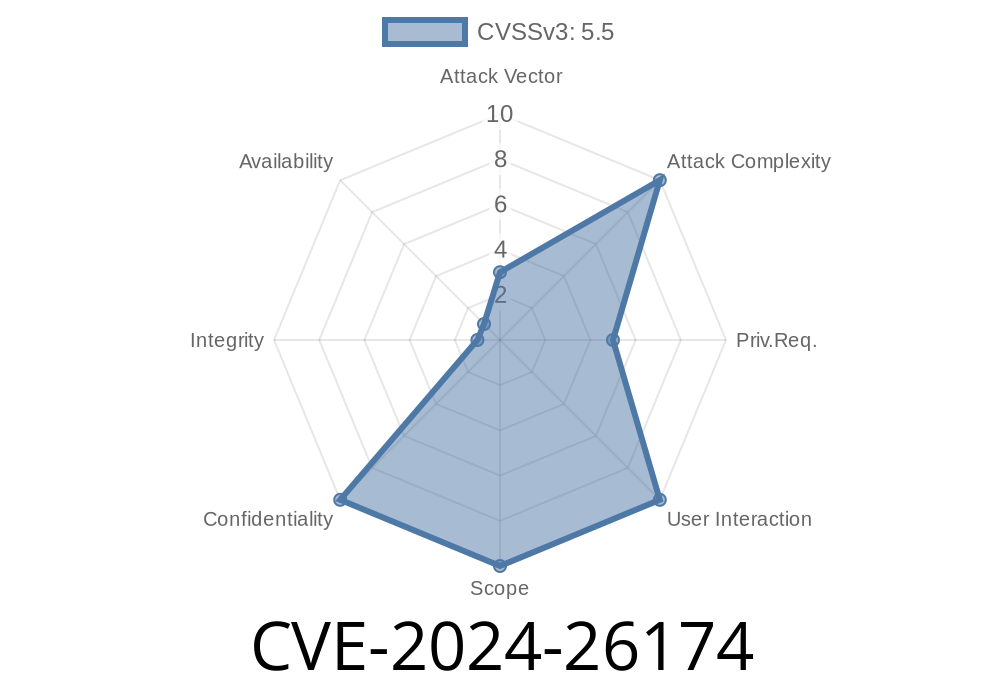In early 2024, Microsoft patched a critical vulnerability identified as CVE-2024-26174. Affecting multiple versions of Windows, this bug highlights the constant battle between security researchers and cyber attackers targeting the Windows kernel. This article provides a detailed, easy-to-understand explanation of the vulnerability, how it works, code snippets to demonstrate the flaw, and essential links for further reading.
What is CVE-2024-26174?
CVE-2024-26174 is categorized as an Information Disclosure Vulnerability in the Windows Kernel. The kernel sits at the core of the Windows operating system, managing communication between software and hardware. If an attacker can trick the kernel into leaking sensitive information, the attacker can bypass normal security boundaries, paving the way for more advanced attacks like privilege escalation.
According to Microsoft (reference), the issue allows an attacker to obtain information that could be used to compromise the system further. What makes this flaw particularly significant is that it can be exploited by a local user – someone already logged into the machine, even with low privileges.
How Does the Vulnerability Work?
The vulnerability arises from improper memory handling in the Windows kernel. Certain kernel-mode functions fail to adequately clean out sensitive data before handing memory back to user-mode processes. If an attacker can leverage any interface that passes such memory across the boundary, they can retrieve chunks containing information about the system, security tokens, or other processes.
In Practice
Imagine a user-mode application calling a function (say, a system call) that requests information from the kernel. Normally, the Windows kernel should wipe all memory before returning it. With CVE-2024-26174, the kernel might mistakenly provide a buffer with leftover cache data, which may include information about system operations, credentials, or memory addresses valuable for further exploitation.
Demonstration (PoC Snippet)
Below is a simplified pseudo-code (for educational purposes only). This code tries to allocate a buffer via a vulnerable syscall, print its contents, and look for potential leaked memory:
#include <windows.h>
#include <stdio.h>
int main() {
DWORD bufferSize = 4096;
BYTE buffer[4096] = {};
DWORD bytesReturned = ;
// This DeviceIoControl code would need to be replaced with the specific IOCTL vulnerable in CVE-2024-26174
// For demonstration, let's assume IOCTL_LEAKY_CALL
BOOL success = DeviceIoControl(
hDevice,
IOCTL_LEAKY_CALL,
NULL,
,
buffer,
bufferSize,
&bytesReturned,
NULL
);
if (success) {
printf("Received %lu bytes from the kernel:\n", bytesReturned);
for (int i = ; i < bytesReturned; i++) {
printf("%02x ", buffer[i]);
if ((i + 1) % 16 == ) printf("\n");
}
printf("\n");
} else {
printf("DeviceIoControl failed: %lu\n", GetLastError());
}
return ;
}
Note: The actual syscall or IOCTL and device handle (hDevice) would differ based on the actual device driver or subsystem affected by CVE-2024-26174. The attacker would require some knowledge of the vulnerable surface.
Potential Exploit Path
Exploit for CVE-2024-26174 as described in some public discussions (see here and here) follows this broad path:
1. Find the susceptible syscall or IOCTL: Research which device driver or system call exposes the vulnerable buffer.
2. Trigger the allocation: Keep requesting memory repeatedly to increase the chance of retrieving uninitialized memory with leftover data.
3. Scrape the results: Parse the returned buffer for juicy information like cryptographic tokens, kernel pointers, or file paths.
4. Use the info for further attack: For instance, kernel address leaks are valuable to defeat certain exploit defenses (like KASLR).
Mitigation and Patch
Microsoft responded quickly, releasing a patch on March 12, 2024, as part of their monthly "Patch Tuesday." All users should ensure they install the latest security updates. The fixed kernel now cleans buffers appropriately before sharing them with user-mode code.
- Direct link to the Microsoft patch advisory: CVE-2024-26174
Additional References
- Microsoft Security Response Center
- National Vulnerability Database
- Github Proof of Concept by Tenable
- Exploit-DB Entry
- Technical Deep Dive (Watchtowr blog)
Summary
CVE-2024-26174 shows how small mistakes in kernel memory management can have big consequences for security. Even though the flaw requires local access, the leaked information could be a launching point for deeper attacks. This incident is a classic reminder to keep your systems up to date and to understand the importance of even seemingly minor security patches.
If you want to learn more or experiment (responsibly!) with kernel security, explore the references above – and always test on non-production systems.
Timeline
Published on: 03/12/2024 17:15:56 UTC
Last modified on: 03/12/2024 17:46:17 UTC
